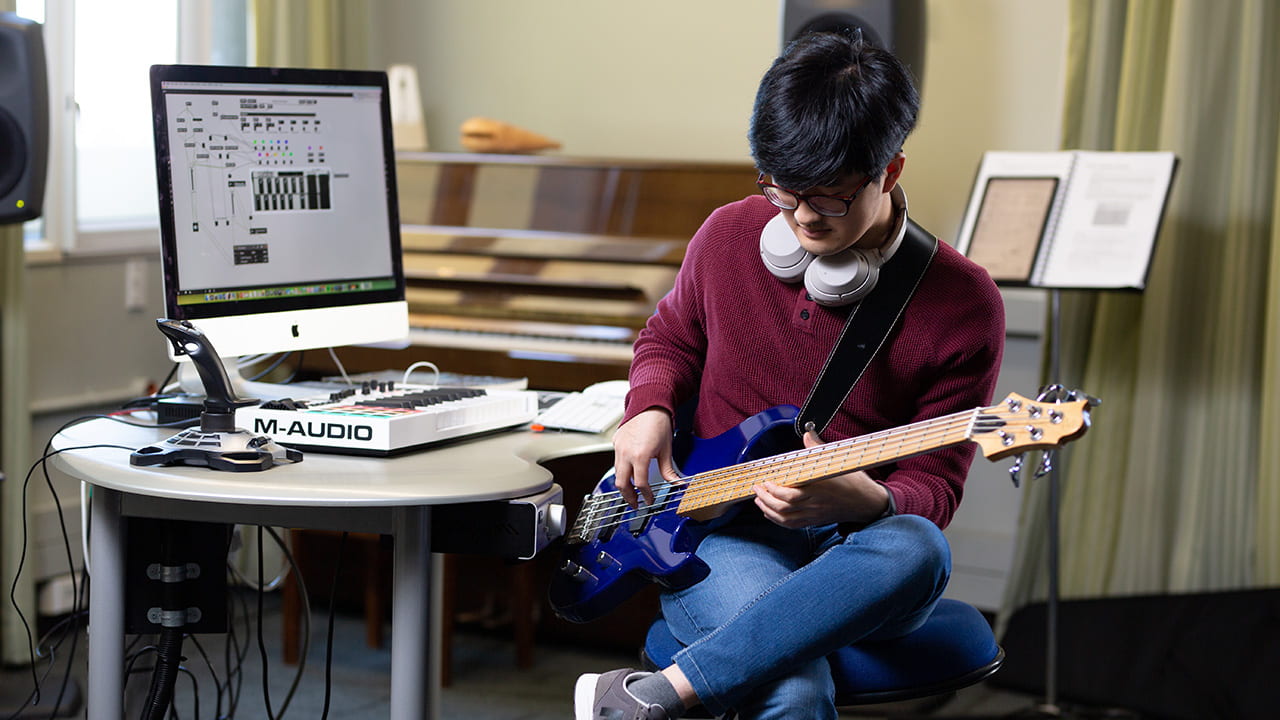Redesigning stage one music courses for online delivery
Two music courses were redesigned for online delivery in response to the COVID-19 pandemic. The course content was chunked and transformed into flipped, self-directed online learning activities, allowing for more synchronous online time for collaboration and practical application of learning.
The redesign required the use of a range of technologies, selected for their efficacy, transferability, affordability, accessibility, and ease of use. This transformation required a high degree of preparation from both teachers and students, with lecturers becoming facilitators of learning and mentors to students.

Background
MUS 103 – Music Fundamentals and MUS 130 – Introduction to Music Technology provide a foundational knowledge of music theory and practice, equipping students with the musicianship skills needed to compose, arrange and perform music throughout their study programme.
In 2020, when the COVID-19 pandemic forced the University to teach remotely, the School of Music realised that it wasn’t just a matter shifting their lectures to Zoom—the learning outcomes required students to develop skills in aural perception, active listening and notation—it required a fresh look at the possibilities of how this could be achieved online, while maintaining whanaungatanga (a sense of community). This also presented an opportunity to attract students from all over Aotearoa | New Zealand, as teaching wasn’t restricted to the physical campus.
Design and implementation
In June 2021, the School enlisted the help of Ranga Auaha Ako | Learning Teaching and Design Team to help redesign the courses to online delivery, while ensuring they remained effective in both achieving the desired learning outcomes and maintaining a positive student experience. They provided guidance and support to the teaching staff until July 2022.
The two parties held regular meetings to explore different ways to create an online learning experience that would match the in-person experience of receiving immediate feedback from the teachers, while experimenting with musical instruments. This was largely achieved by chunking lecture content and transferring selected content to self-directed online learning activities. Active learning approaches helped to sustain student engagement and provided opportunities for practical and collaborative learning.
Interactive lessons were created to include:
- Videoed lecture segments with opportunities for student interaction.
- Targeted H5P tutorials and simulations.
- Links to relevant external resources and practice or experimental learning through keyboards, software and associated programmes.
Providing self-paced, active learning activities reduced the amount of lecture time allowing for more synchronous online time to be used for community building, collaboration, practical application, and clarification of challenging components.
The course required the use of a variety of technologies that were carefully researched and curated to ensure efficacy, transferability, affordability, accessibility, and ease of use. Among the selected technologies were Note Flight, GroovePizza, Musition, Auralia, Notion, and DAW (specialised Digital Audio Workstation software used for assessment). Weekly practical assignments were introduced, constituting 30% of the course grade, and designed to ensure authentic assessment of students’ application of learning to music-making. Summative assessments were conducted via Canvas.
Outcomes and Evaluation
The redesign of MUS103 has involved a significant shift in pedagogy for both teachers and students. The adoption of a flipped teaching methodology required careful curation of self-paced online experiences that support and scaffold learning. Lecturers act as facilitators, providing mentorship and guidance to students as they experiment and apply new learning to their music practice. The restructured course gives students more control over their learning pace, allowing them to manage their learning outside of live sessions. This approach has led to increased retention rates and positive feedback from students.
In recognition of the many strengths identified in the course, and to inform iterative course design, Ranga Auaha Ako completed a Technology Enhanced Learning Accreditation Standards (TELAS) evaluation for the course. TELAS is a course review framework that measures online learning quality.
The complete transition of MUS 103 to online delivery extends the opportunity to learn music fundamentals to students well beyond the traditional university timetable, albeit in a more self-regulated way. The reduction in lecture time has been allocated to small-group and individual support for students and this approach scales well for growing the programme.
Overall, the redesign of MUS103 has been a success, providing students with a high-quality learning experience and extending the potential for greater participation in the wider domestic and international market.
